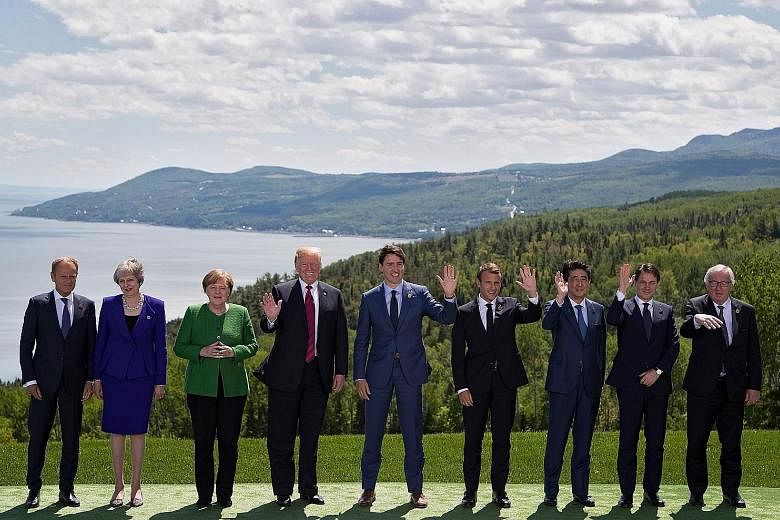LA MALBAIE (Quebec) • US President Donald Trump said yesterday that he brought up the dramatic prospect of completely eliminating tariffs on goods and services at the Group of Seven (G-7) summit, even as he threatened to end all trade with America's closest allies if they do not stop what he says are unfair trade practices.
"It's going to stop. Or we'll stop trading with them. And that's a very profitable answer, if we have to do it," Mr Trump said, adding: "We're like the piggy bank that everybody's robbing and that ends."
Briefing reporters immediately before cutting short his stay at the conference in Quebec and heading to Singapore for a nuclear summit with North Korean leader Kim Jong Un, Mr Trump firmly denied the G-7 meeting had been contentious.
"No tariffs, no barriers. That's the way it should be. And no subsidies. I even said, 'no tariffs'," Mr Trump said, while defending his decision to impose a global tariff on US imports of steel and aluminium.
The President's public comments on trade echoed the complaints he made directly to the leaders from Canada, Japan and Europe in private sessions on Friday.
Mr Trump confronted several of the leaders individually, giving examples of how each of their countries had mistreated the US in his view, whether it be trade barriers or security commitments, according to a European official.
Several of the leaders responded aggressively to Mr Trump's demands, listing their own complaints about US policies on tariffs and other trade measures, the official said. Several countries have said publicly they will retaliate against the US' new steel and aluminium tariffs with increased tariffs of their own.
Nevertheless, the G-7 leaders appeared to be limping towards something that could look like a win at the two-day summit, even if it came far short of the broad communique signed by all attendees that typically comes out of their summits.
German Chancellor Angela Merkel has proposed a forum - a "shared evaluation mechanism" - aimed at defusing the tensions, and the idea has the backing of other European members. However, it is unclear if it will get US support.
A German government official said the plan would see direct talks between the EU and the US start straight away, and last around two weeks, focused on how much, or whether, EU trade policy endangers US national security interests.
Low expectations for the meeting, which ended yesterday, could allow leaders to cast any consensus as an achievement, especially given that Mr Trump and most of the other G-7 leaders headed into the talks appearing ready to fight.
Mr Trump spent the days leading up to the meeting tweeting complaints about the summit's "indignant" host, Canadian Prime Minister Justin Trudeau, and French President Emmanuel Macron, arguing that both leaders refused to budge on their trade positions.
By the time he sat face-to-face with Mr Macron on Friday, though, Mr Trump was publicly heralding "progress" on the very issues he had been grousing about.
Instead of fighting big battles, his counterparts were angling for a baseline of agreement that might be as low as an acknowledgement of the important role of the G-7.
Mr Trump yesterday also reiterated his stance on the need to bring Russia back into the fold of the international community.
"I think the G-8 would be better. I think having Russia back in would be a positive thing. We're looking for peace in the world. We're not looking to play games," he said.
However, Russian Foreign Minister Sergei Lavrov said yesterday that Russia has not asked to rejoin the group and is happy working with the larger G-20.
Mr Trump also said his fellow G-7 leaders had expressed their commitment to containing Iran's nuclear ambitions.
His early departure meant that he missed a working session among the leaders on climate change and clean energy, as well as talks among the G-7 and poorer countries focused on the health of oceans.
NYTIMES, AGENCE FRANCE-PRESSE, REUTERS, BLOOMBERG

